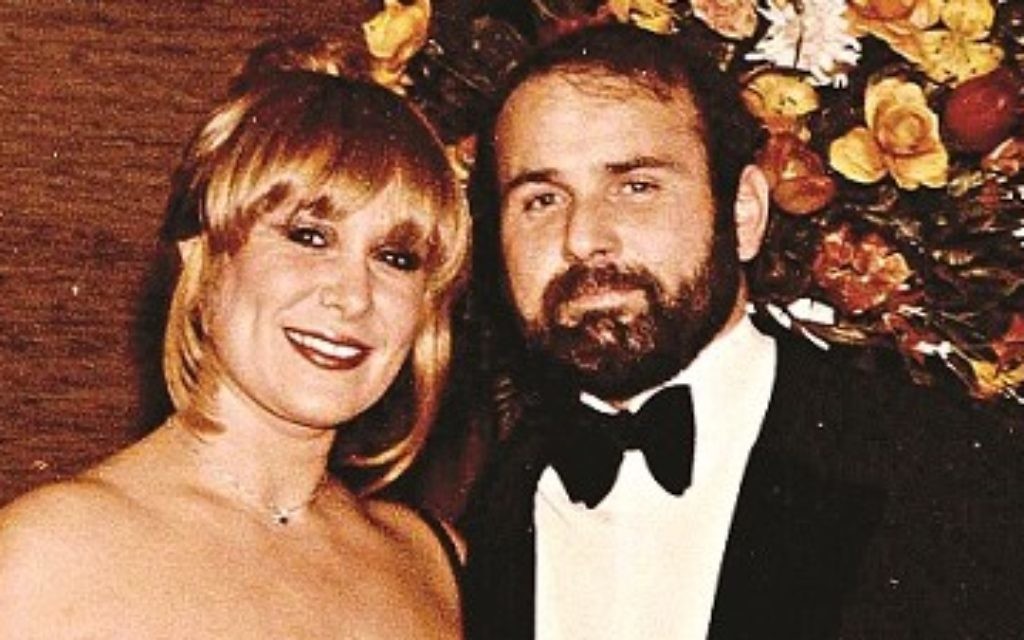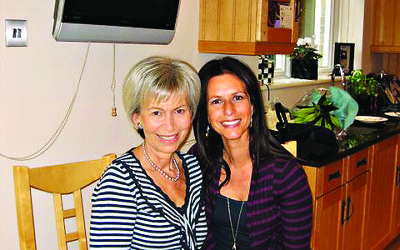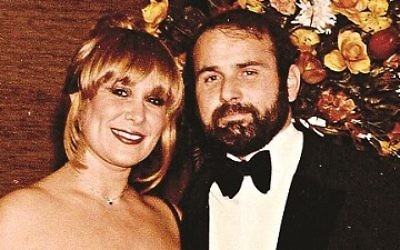Coping with loss during the High Holy Days
Feeling the loss of a loved one can be profound during the festivals. Louisa Walters shares her story
When you lose someone the first of everything is the hardest – the first Yom Tov, the first birthday, the first anniversary of the death. All eyes are drawn to the empty chair round the table, but slowly you learn to focus on the chairs that are still filled.
I walked into the kitchen one morning just before Rosh Hashana when I still lived at home to find my mum elbow deep in chopped fish, rolling it into balls, tears streaming down her face. Those pale, wet, yellow balls, each one with a slice of boiled carrot on top, were a signature dish of Yom Tov in our house for as long as I could remember.
Get The Jewish News Daily Edition by email and never miss our top stories Free Sign Up
They were the only thing my Nana could make that was in any way edible and every Yom Tov she would bring us with a large Tupperware container filled with them. Not this year, though. This was the first Yom Tov without my Nana, and now Mummy was having to make her own.
And so it is that now I stand cooking in my kitchen at Rosh Hashana, at Chanukah, at Pesach and indeed on many of the days in between, with the tears rolling down my cheeks – for I too have now lost my mum.
Even for those who are not deeply religious, going to shul can be hugely comforting for the newly bereaved. It’s a place to reflect and to connect with both your past and your future.
For Maxine Tager, who was 43 when she lost her father, the Kol Nidre service took on extra significance after he died. “My mum gave my husband my father’s tallis and he dons it every year on Kol Nidre. This way Daddy is still with us on that most auspicious of occasions. “
I also find that when I’m in shul the music unlocks my emotions, and while this may cause me pain, it brings me comfort too.”
Yom Kippur is also of tremendous significance to Carole Grant. Her husband Geoffrey drowned on Herzilya beach on Erev Yom Kippur 1989.
“In the early years it was so hard to get through Yom Kippur. A friend told me to break the day down into segments and just try and get through half an hour at a time. This really did help.”
Never a religious person, Carole still felt it important to uphold the traditions of the high holy days, and after Geoffrey’s death it was even more significant to mark Yom Kippur.
A plaque was installed at the Great Western Synagogue in Marble Arch in his name. “When I go to the shul, where my husband used to go with his father, and look at the stained glass panels on the walls I feel incredibly moved by the experience and I it is just right that I am there.
This year – the 25th anniversary will be particularly poignant for me, but the passing of time is acute in a synagogue as over the years familiar faces dissappear. ”
Last year, Carole spent Yom Tov with friends in Portugal, where the small Jewish community hosted prayers on a rooftop. “There, under a deep blue sky, I felt uplifted and in a way closer to G-d. It was an amazing experience.”
The first Rosh Hashana I was without my mum I was very worried about going to shul – all the familiar faces looking at me with pity in their eyes.
Looking down to see my dad and knowing that when he looked up he would see the void beside me. But also beside me was my daughter, and beside my dad was my son, my husband and my brother. I drew strength from them, from the role that I had assumed and must continue to assume.
Yom Kippur brought a fresh set of challenges. When shul started to empty for Yizkor and my friends, my husband and my children got up to leave, I felt terribly alone.
And angry that suddenly I was forced to remain for this most sombre of services. This was a true marker of my new status in life. But once the service began I felt a sense of calm and comfort. I wasn’t alone. All the other people still in their seats had lost someone too.
The Jewish Bereavement Counselling Service advises that you shouldn’t expect too much of yourself other than getting through this important challenge in the calendar.
The first experience of festivals can be daunting for anyone newly bereaved. Indeed, coping with normal routine feels difficult enough in the early days, let alone special occasions.
The JBCS says that being aware and acknowledging how different this special time is going to be goes some way towards preparing for the absence of a loved one at Yom Tov. In fact, marking the chagim slightly differently and therefore changing the normal pattern can help, as these patterns and traditions hold such powerful memories.
Having someone with you for extra support at synagogue can help too, especially if saying Yiskor for the first time.
As another Yom Tov approaches and I shop, cook, and sit at the head of my table surrounded by my family, I am grateful to be fit and well enough to do these things.
I gather my thoughts and dig deep to find the strength to cope with the high days, the holy days and the plain old ordinary days.
jbcs.org.uk
Tel: 0208 951 3881
Email: enquiries@jbcs.org.uk

Thank you for helping to make Jewish News the leading source of news and opinion for the UK Jewish community. Today we're asking for your invaluable help to continue putting our community first in everything we do.
For as little as £5 a month you can help sustain the vital work we do in celebrating and standing up for Jewish life in Britain.
Jewish News holds our community together and keeps us connected. Like a synagogue, it’s where people turn to feel part of something bigger. It also proudly shows the rest of Britain the vibrancy and rich culture of modern Jewish life.
You can make a quick and easy one-off or monthly contribution of £5, £10, £20 or any other sum you’re comfortable with.
100% of your donation will help us continue celebrating our community, in all its dynamic diversity...
Engaging
Being a community platform means so much more than producing a newspaper and website. One of our proudest roles is media partnering with our invaluable charities to amplify the outstanding work they do to help us all.
Celebrating
There’s no shortage of oys in the world but Jewish News takes every opportunity to celebrate the joys too, through projects like Night of Heroes, 40 Under 40 and other compelling countdowns that make the community kvell with pride.
Pioneering
In the first collaboration between media outlets from different faiths, Jewish News worked with British Muslim TV and Church Times to produce a list of young activists leading the way on interfaith understanding.
Campaigning
Royal Mail issued a stamp honouring Holocaust hero Sir Nicholas Winton after a Jewish News campaign attracted more than 100,000 backers. Jewish Newsalso produces special editions of the paper highlighting pressing issues including mental health and Holocaust remembrance.
Easy access
In an age when news is readily accessible, Jewish News provides high-quality content free online and offline, removing any financial barriers to connecting people.
Voice of our community to wider society
The Jewish News team regularly appears on TV, radio and on the pages of the national press to comment on stories about the Jewish community. Easy access to the paper on the streets of London also means Jewish News provides an invaluable window into the community for the country at large.
We hope you agree all this is worth preserving.
-
By Laurent Vaughan - Senior Associate (Bishop & Sewell Solicitors)
-
By Laurent Vaughan - Senior Associate (Bishop & Sewell Solicitors)
-
By Laurent Vaughan - Senior Associate (Bishop & Sewell Solicitors)
-
By Laurent Vaughan - Senior Associate (Bishop & Sewell Solicitors)
























